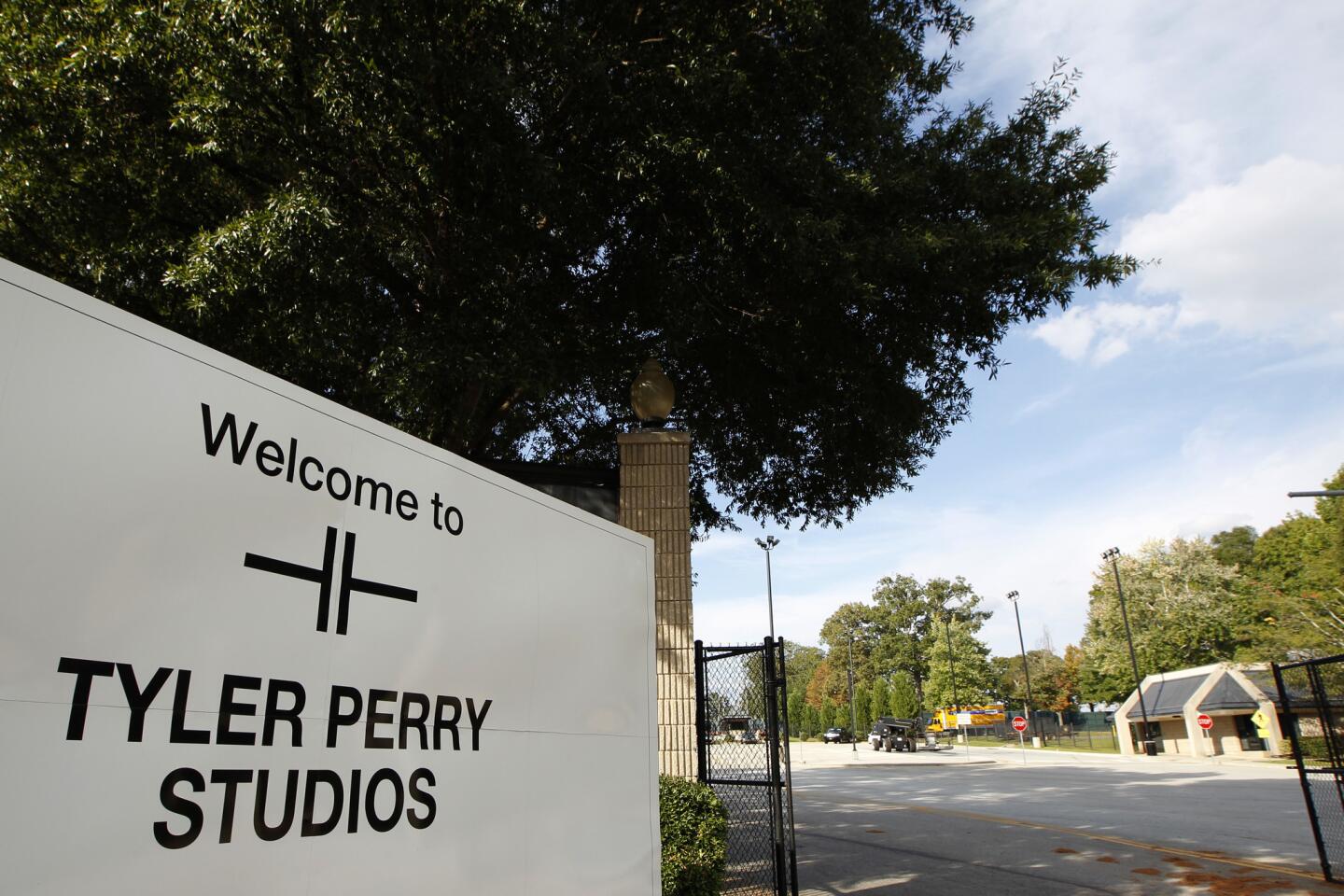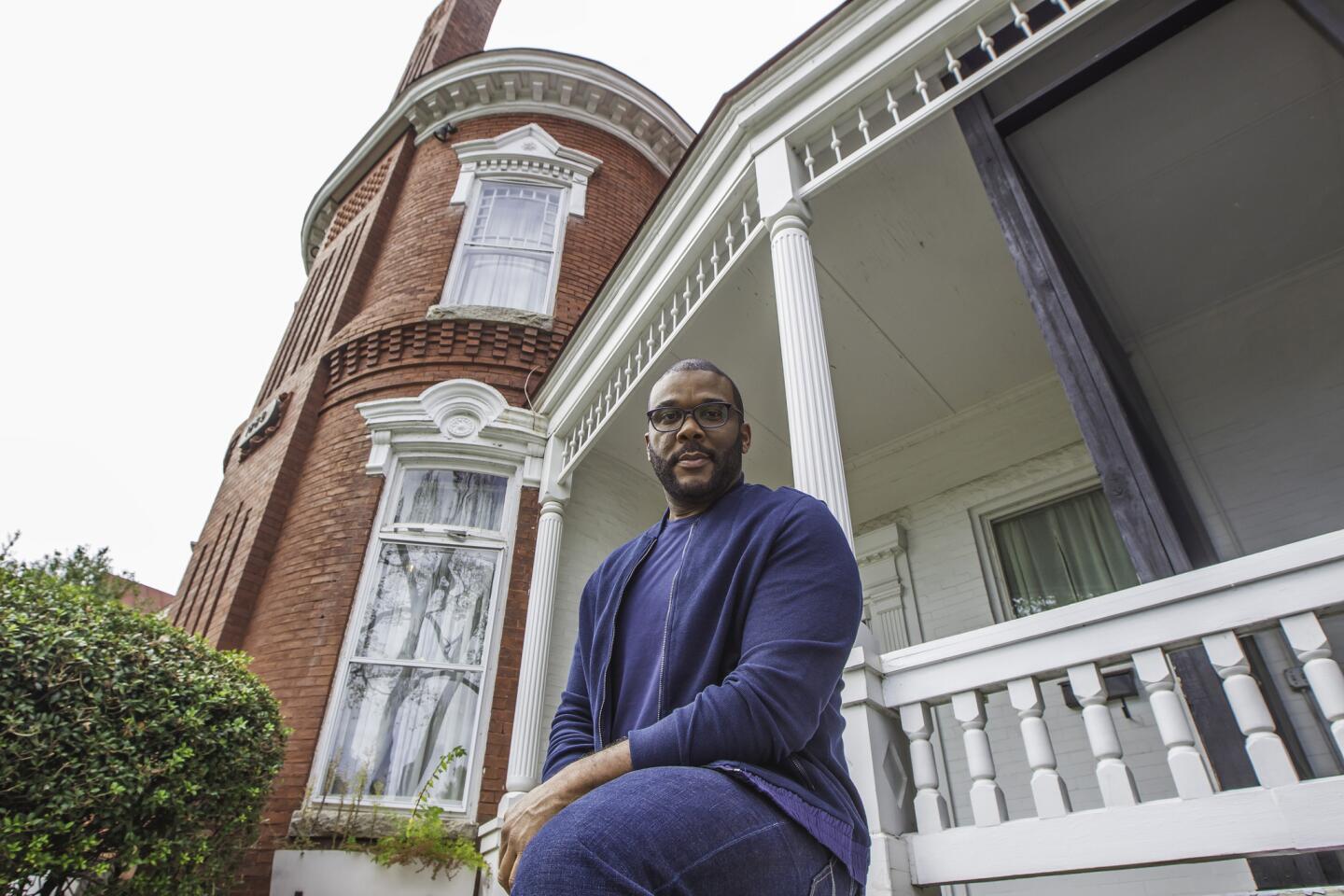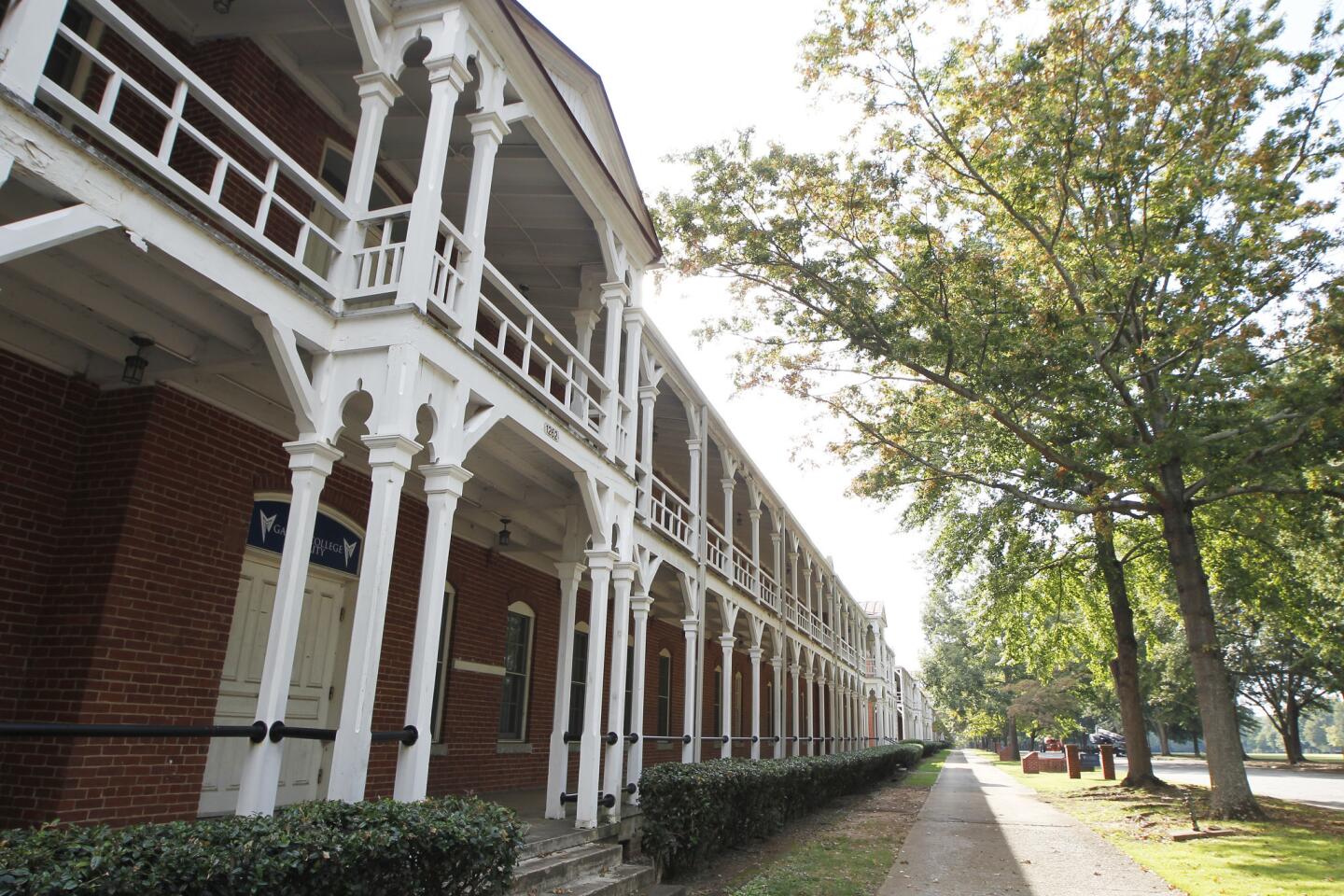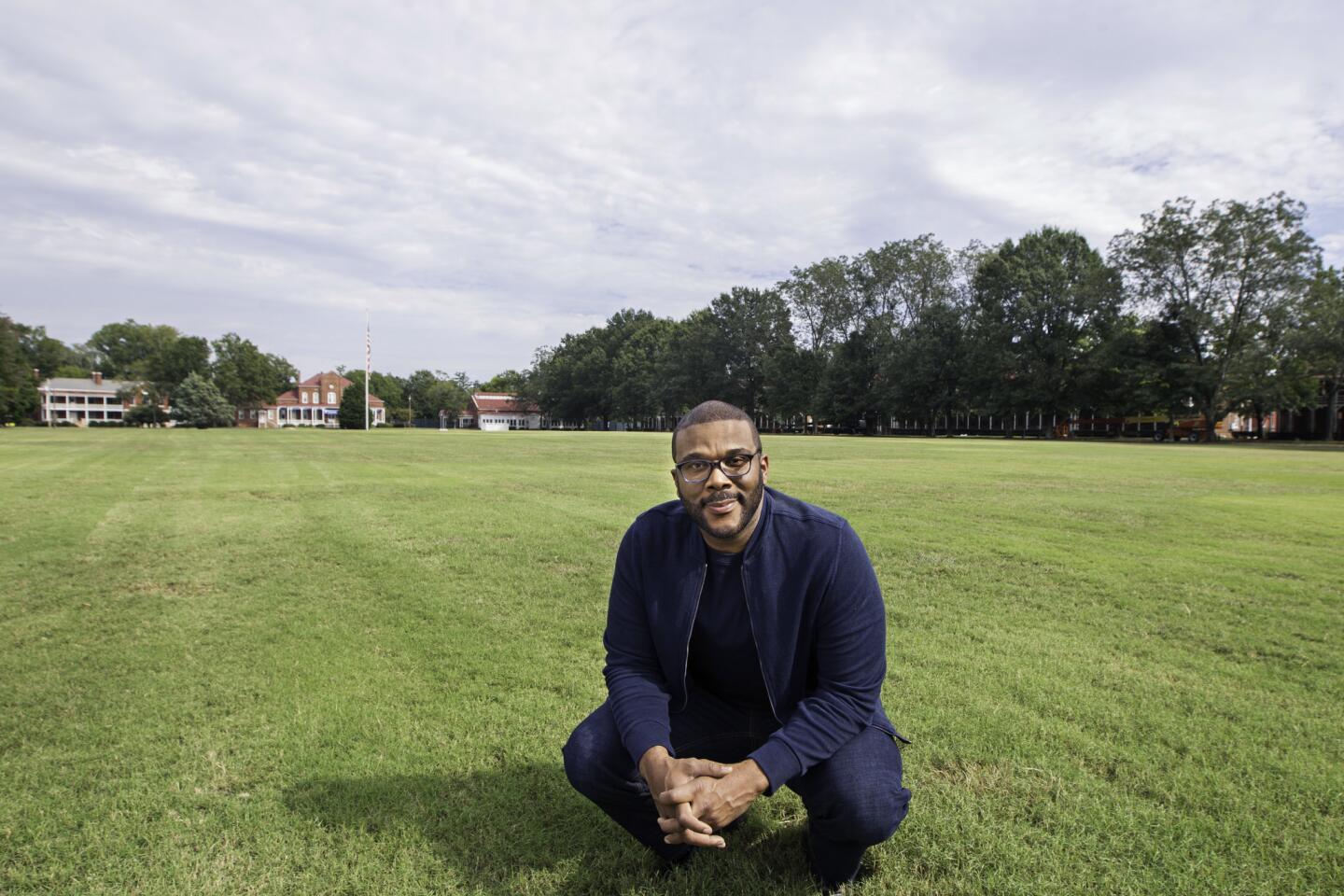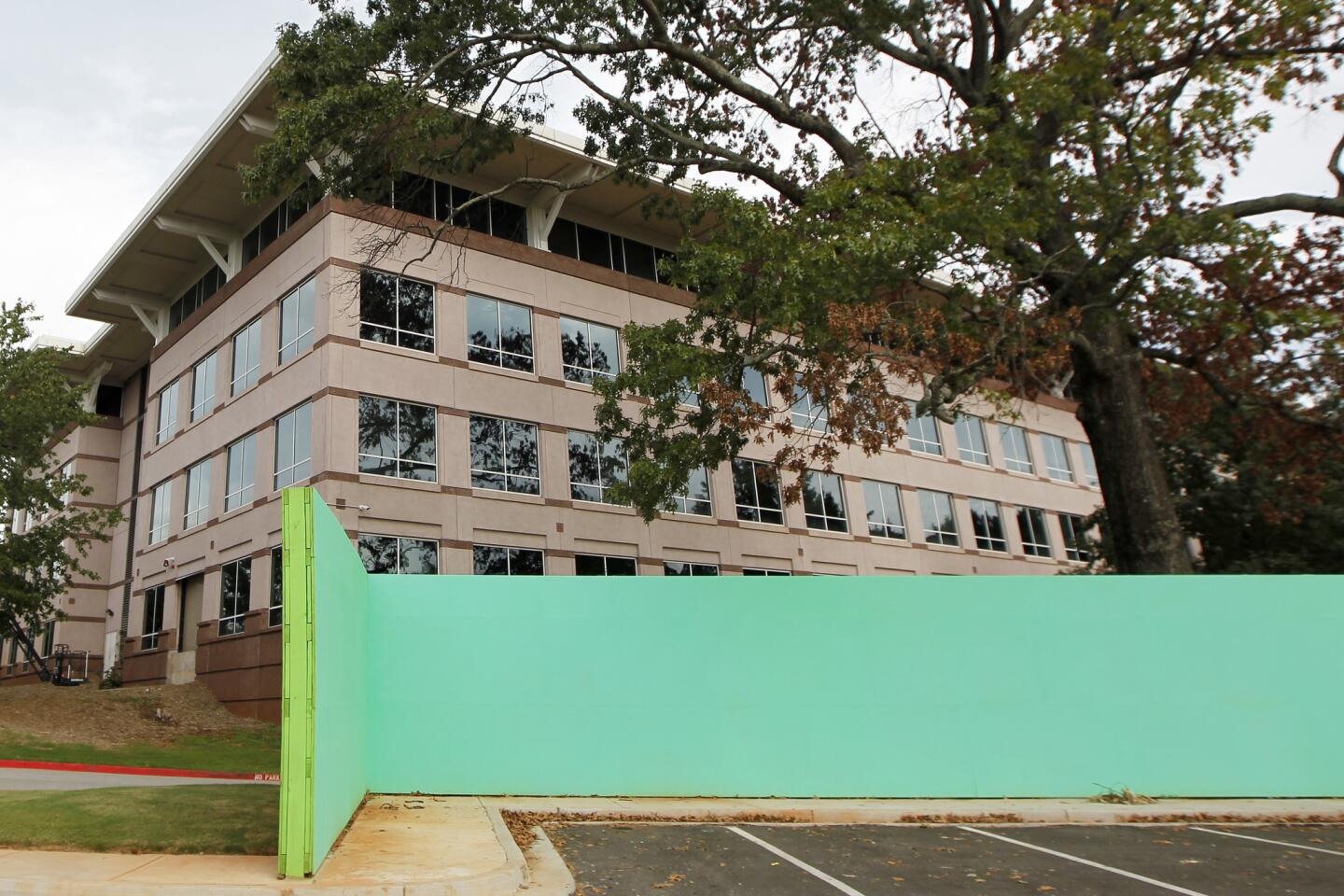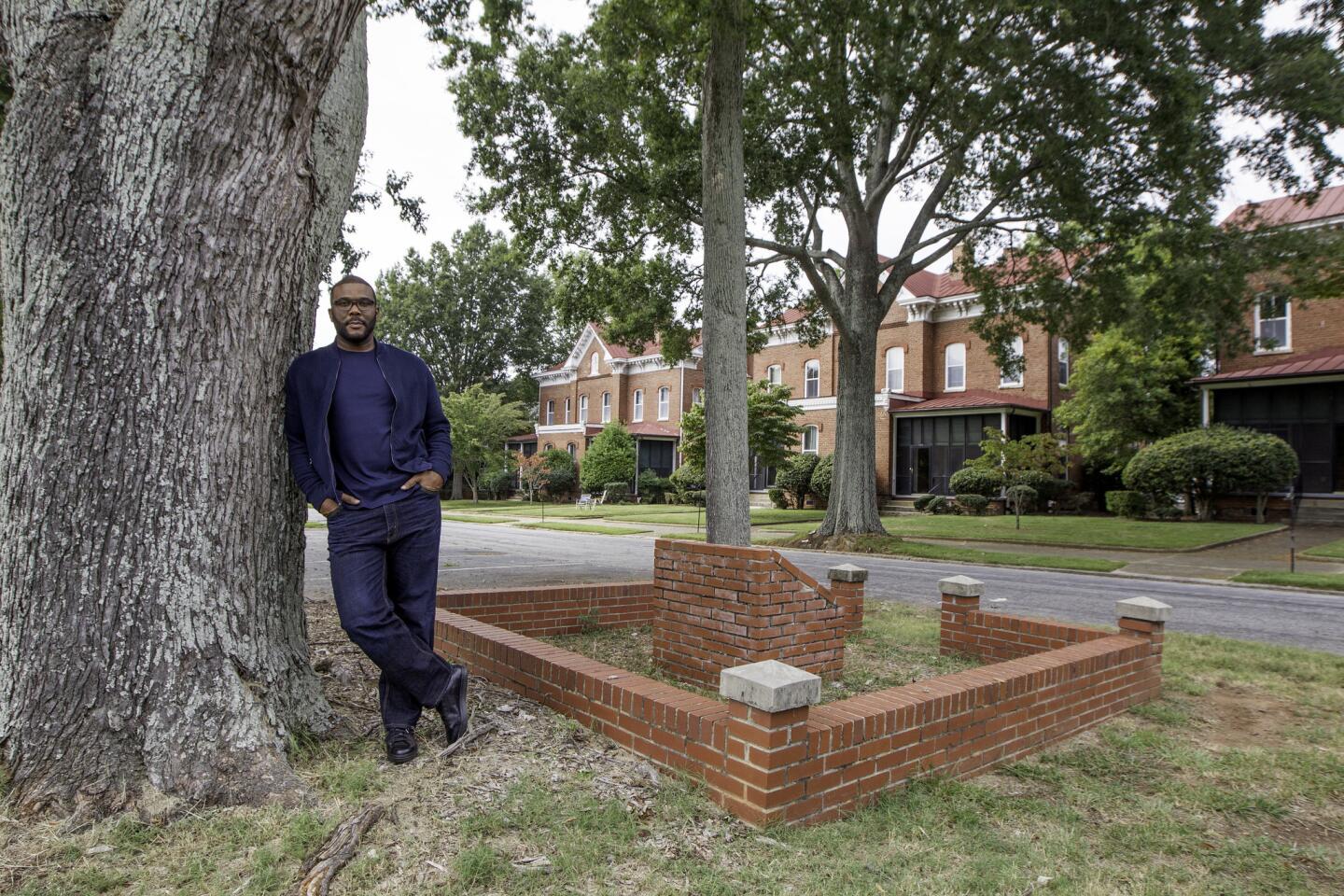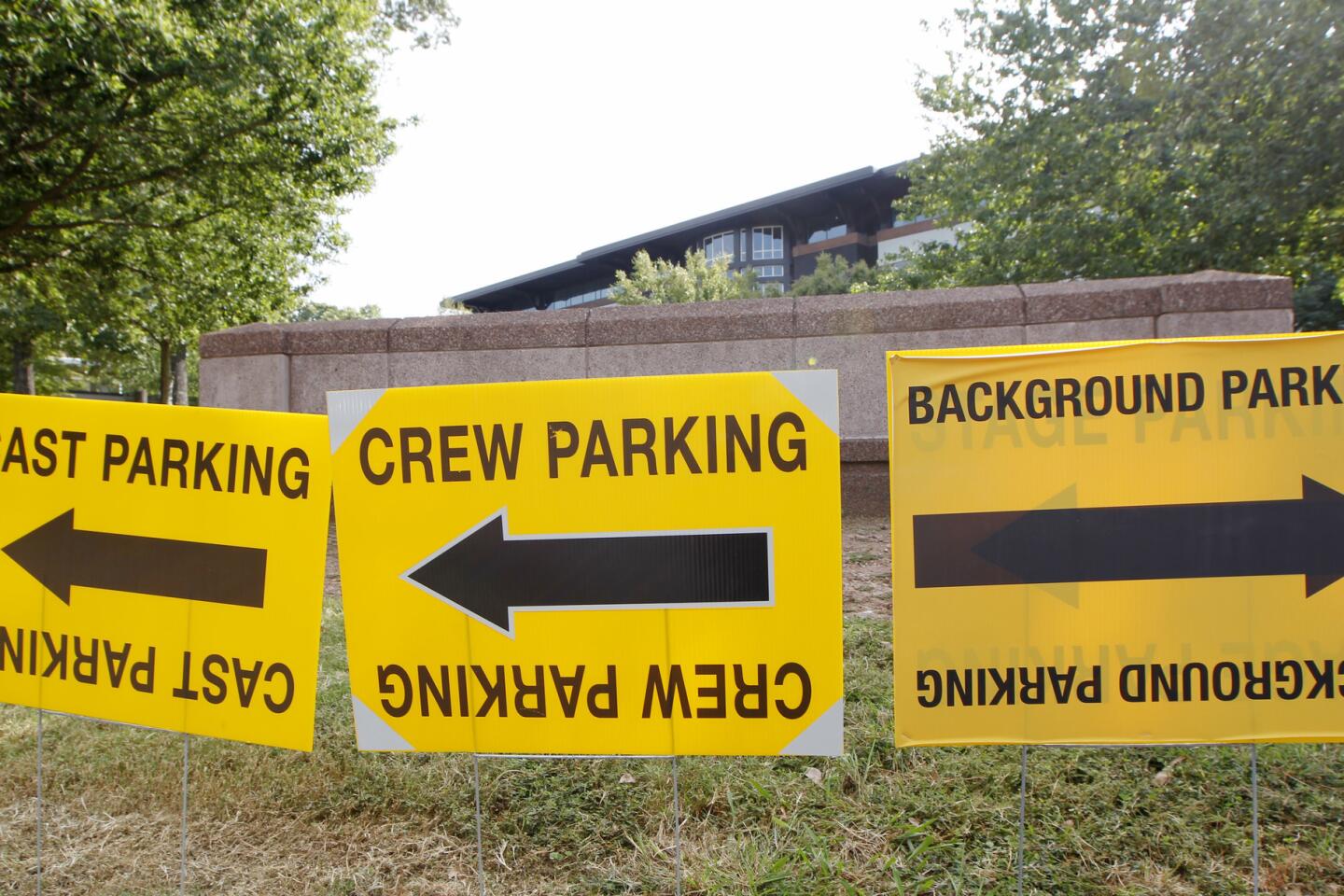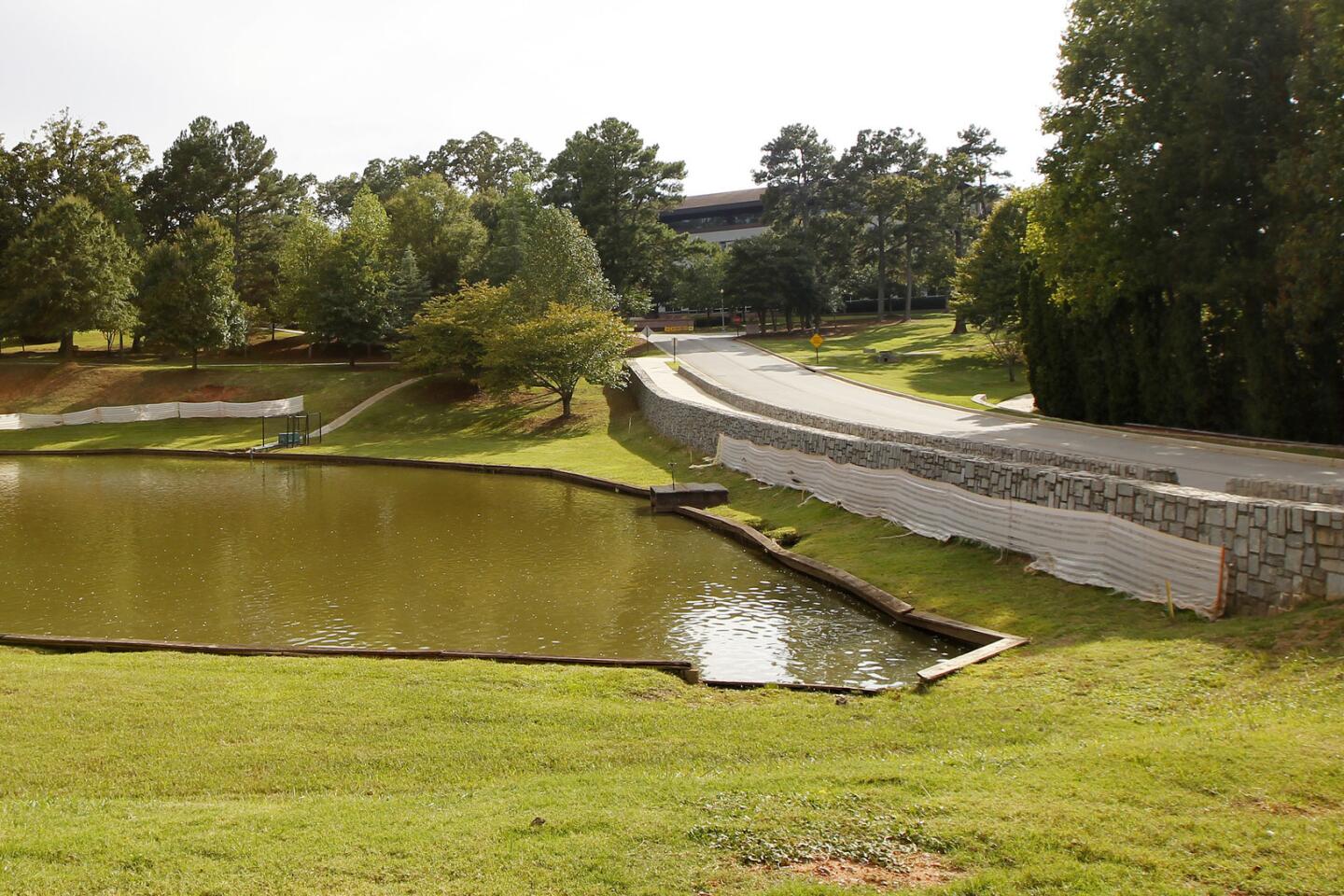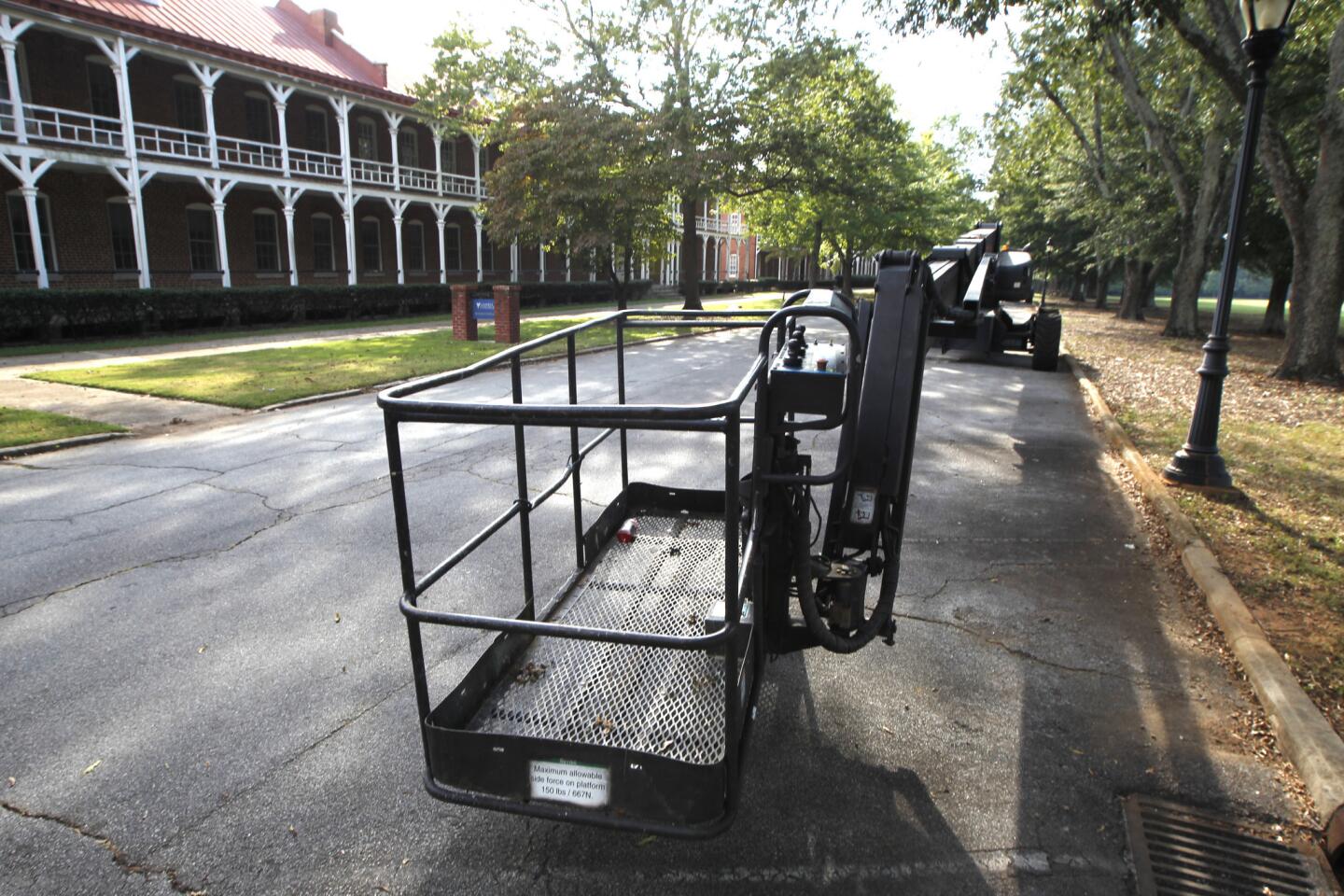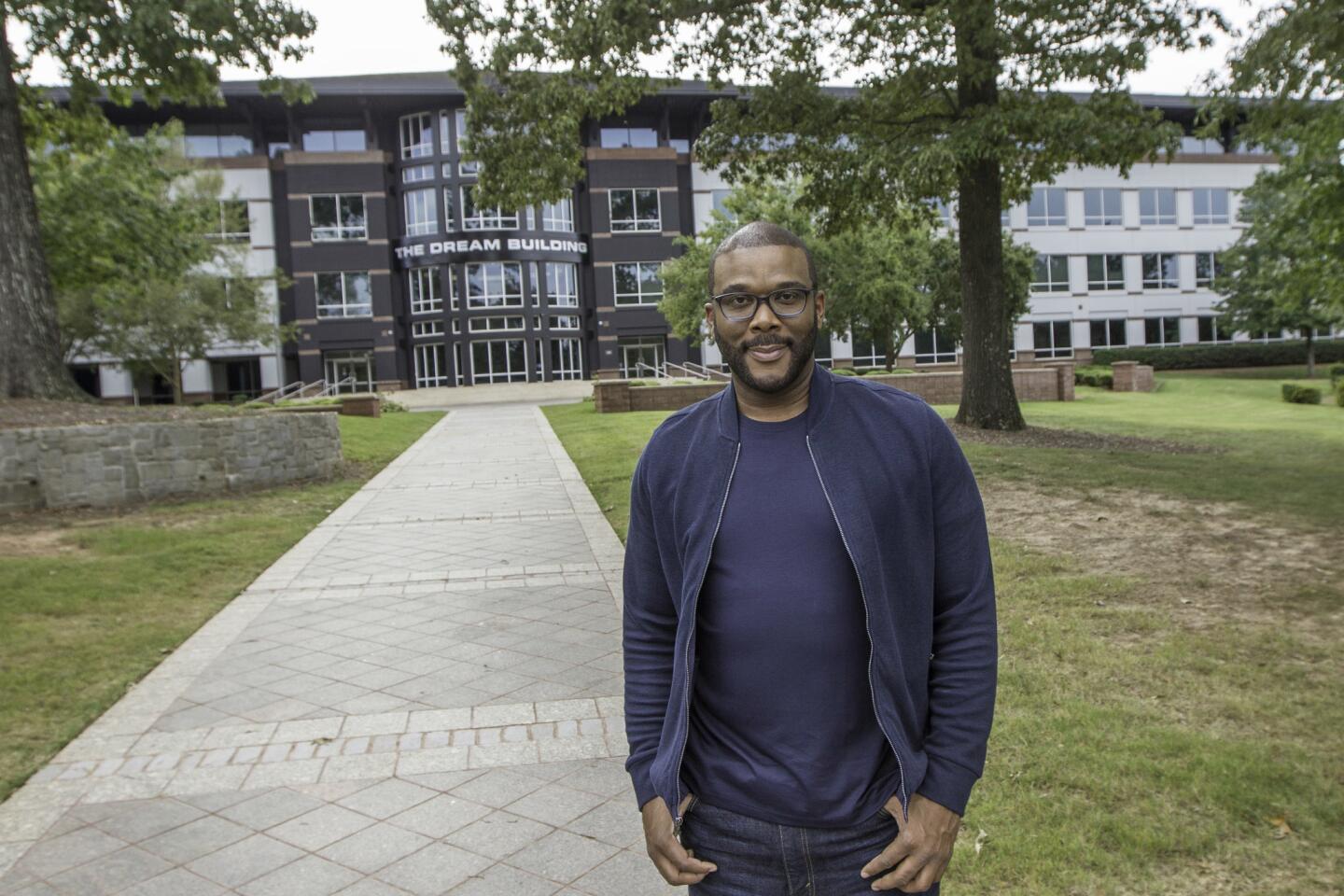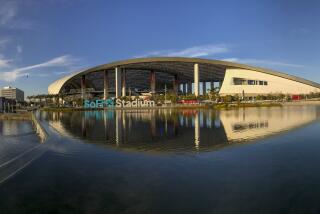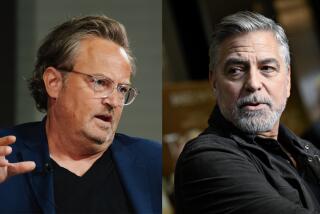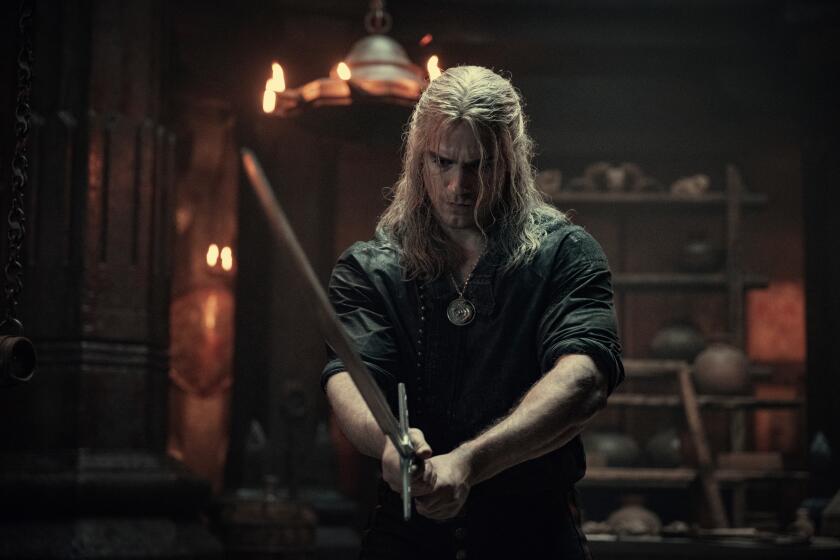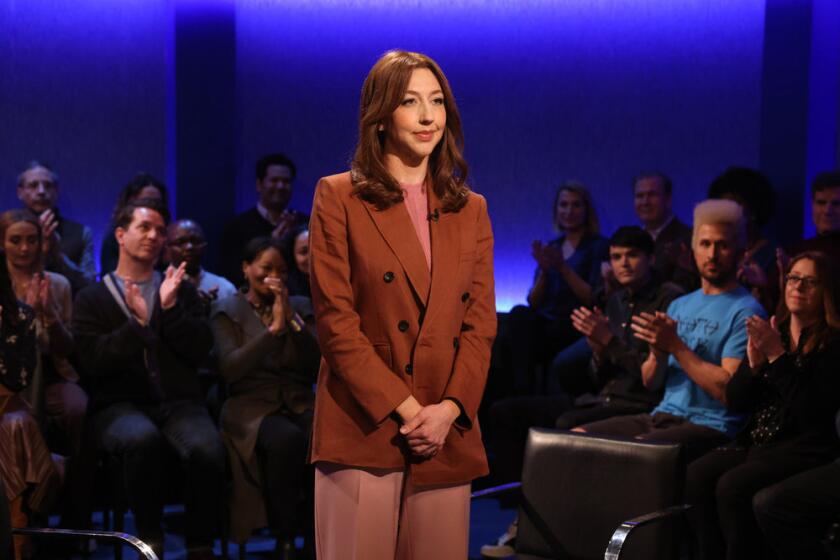Take a tour of Tyler Perry’s massive new studio on a former Army base in Atlanta
“Better make sure that door is fastened,” Tyler Perry says, slipping into the driver’s seat of a small off-road utility vehicle as his passengers climb in. “I wouldn’t want you to fall out.”
With a sly smile, Perry — the most successful African American filmmaker in history and the ruler of an entertainment empire of hit movies, TV series and plays — maneuvers the vehicle from a parking lot near the entrance of the historic Ft. McPherson Army base onto a paved road. Suddenly, he veers off into a massive, rolling sea of lush greenery.
He passes various sights on the vast, grassy landscape; a white yacht resting on a platform, surrounded on three sides by sheets of greenscreen; large ponds with frolicking geese; a trailer park; a cluster of well-kept brick buildings. No one is around. The only sound is the roar of Perry’s engine.
“For me, this is pure paradise,” Perry says, surveying the view with obvious pride.
In a few hours, he would appear at a theater in the city’s Atlantic Stationfor the first preview of his new release, “Tyler Perry’s Boo! A Madea Halloween.” It is the first big-screen appearance in three years by Madea, the gun-toting, insult-hurling grandmother played by Perry in drag, his most popular — and controversial — character.

Tyler Perry returns as Madea in “Tyler Perry’s Boo! A Madea Halloween.”
But Perry’s bliss this hot October afternoon involves more than his anticipation at the reaction to what he calls his “funniest movie yet.” (The film opens nationwide Oct. 21). He is marveling at what he labels his most significant accomplishment — and the key essential element of his influential legacy, which transcends his creative aspirations.
The property he is traversing is his new kingdom — 330 acres of open space and historic buildings he acquired last year and is transforming into the latest incarnation of Tyler Perry Studios — a production facility that, when formally completed in late 2017, will be one of the largest studios in the country.
The acquisition secures Perry’s place as the first African American to own a major film studio outright. He considers it the crown jewel of his enterprises, which are propelled by a brand anchored in raucous humor and heartfelt melodrama and flavored by a faith-based message of empowerment, perseverance and hope.
“Sometimes I drive around here by myself and think, ‘Is this too much, or is this what I’m supposed to do?’” Perry says, driving to the main office that he has christened “The Dream Building.” “The answer is obvious. When this fell into my lap, I said, ‘I have to do this.’ This is the endgame.”

The 330-acre site was an active military base from 1885 to 2011.
An active military base from 1885 to 2011, the studio will serve as headquarters for his movies (“Boo! A Madea Halloween” was filmed there) and TV shows such as OWN’s “The Haves and the Have Nots,” “Love Thy Neighbor,” “If Loving You Is Wrong” and TLC’s new scripted series, “Too Close to Home.” It will also be able to accommodate numerous outside productions (AMC’s “The Walking Dead” and HBO Films” “The Immortal Life of Henrietta Lacks,” starring Oprah Winfrey, are already filming there).
Tyler Perry Studios is the most vivid illustration of the ownership strategy the Louisiana native has followed since he began breaking through to the mainstream more than two decades ago after relocating to Atlanta. Perry has made it a point to control and own his brand. He had considered launching his own TV network before signing an exclusive production deal in 2013 with Winfrey’s OWN network.
His earliest productions were crafted on a couple of sound stages he had purchased. The first Tyler Perry Studios sat on 60 acres occupied by multiple buildings he converted in the city’s Greenbriar area.
“No matter what I did, I was very adamant that I had to own it,” Perry says, settling into a lavish office that included a grand piano and pictures of him with President Obama and Winfrey.
“Even if I didn’t have the budget of the big shows or the movies, owning the copyright was so important so that I could eventually build something to this magnitude, to build what you’re seeing now.”
Situated on the grounds is a district featuring 37 houses and buildings built between 1889 and 1910. The 200 acres of greenspace includes golf course fairways, ponds and woodlands. Plans are to build at least 14 sound stages, with the largest one measuring about 60,000 square feet and containing a water tank. The base will also have backlots and major practical sets.
“The Dream Building,” which houses the corporate headquarters, is already an impressive production hub. One floor — called “Set World” — contains several sets, including a replica of the Oval Office. The building also has a gym, a cafeteria and a security office that resembles a small NASA control center.
The mogul is not the first African American to helm a studio. Oscar Micheaux, regarded as the first major black filmmaker, established a film and book company in 1918. Actor-director Tim Reid (“WKRP in Cincinnati”) and his wife, Daphne Maxwell Reid, established New Millennium Studios in Petersberg, Va., in 1997 and ran the 60-acre studio until its sale last year. Robert Townsend (“Hollywood Shuffle”) purchased a campus, Hollywood Professional School, in 1990 and renamed it Tinsel Townsend Studios. (The facility was destroyed in an earthquake in the mid 1990s.)
But, Perry points out, “no other African American has had something of this size, of this degree, without a partnership or conglomerate or some major company behind it.”
To get a sense of the sheer magnitude of Tyler Perry Studios, consider the size of other major studios. Warner Bros. Studios in Burbank, considered one of the premium studios in the country, rests on 145 acres. Burbank’s Walt Disney Studios, which serves as both the corporate headquarters and the filming base for several film and TV productions, sits on 51 acres.
No other African American has had something of this size, of this degree, without a partnership or conglomerate or some major company behind it.
— Tyler Perry
The Perry facility will likely help fuel Atlanta’s status as a major shooting location thanks to a generous tax credit that allows filmmakers to offset as much as 30% of their qualified expenses. Productions based in Atlanta in addition to “The Walking Dead” include Fox’s upcoming reboot of “24,” CBS’ new “MacGyver,” WGN’s slavery drama “Underground” and the latest installment in the Marvel Comics superhero franchise, “Avengers: Infinity War.”
Said Lee Thomas, deputy commissioner of the Georgia Film, Music & Digital Entertainment Office: “It’s great to have this kind of investment. Our growth is directly attributable to this kind of investment and makes the longevity possible, attracting more and more projects.”
Perry, who produces, writes, directs — and often appears — in his projects and has a reported net worth of $400 million, declined to say how much he paid for the base or how much he is investing in its renovation, allowing only it’s a “significant personal investment.”
He’s already rubbing his hands together anticipating the added glow for what the studio will mean for his projects.
“The last studio I was on, I shot at every tree, every corner, every blade of grass I could,” Perry says. “So to have 300 acres of unbridled imagination is a license to create and create and create and create. But what it also does is have the production value of everything I do look so much grander. That was very important. In the beginning, I knew there were sacrifices that had to be made. If I were going to own, the budgets could not be over a certain amount. Now that I’m at this place, I can give greater production values.”
But he maintains that the new studio is more than just a large creative sandbox for his projects. It symbolizes what he calls his “commitment to empowerment” and hopes that it serve as a model while giving a major boost to cultural diversity in an industry that has long wrestled with including people of color in meaningful roles in front of and behind the camera. He is also providing employment, hoping to create 3,000 to 4,000 new jobs and recruit people from the poorer communities around Atlanta. He is, he says, “giving back.”
“The responsibility is huge for anyone who has something like this,” says Perry. “That’s why I named [it] ‘The Dream Building.’ When you walk in these doors, it’s OK to dream. In this economic area, in this neighborhood, for people to be able to see this happening and see my face, it’s moving. I get it. I didn’t have this kind of role model growing up. There was no one in the neighborhood to look up to.”
His quest to be a champion for African Americans may cause some inside and outside black creative circles, who have lashed out against his brand, to reassess their views about him and his fare. In past years, Perry has come under fire from artists such as Spike Lee, scholars and others who have charged him with specializing in low-brow humor that spotlights over-the-top black characters and ethnic stereotypes.
At the center of that target is Madea, who has been the main character in several of Perry’s films and stage plays.
Those critiques have done little to dent Perry’s popularity with his formidable fan base, which has remained supportive and loyal. National tours of his plays, in which he plays Madea, consistently sell out. His OWN shows helped reverse the fortunes of that network, which had suffered a stream of executive upheavals, programming missteps and lackluster ratings since its 2011 launch.
I respect Tyler Perry, although I empathize with people who feel his work is regenerative
— Lanita Jacobs, associate professor of anthropology, American studies and ethnicity at USC
“Boo! A Madea Halloween,” with the tough-talking grandma facing off against zombies and scary monsters, is poised to be one of the leaders of this weekend’s box office.
“I respect Tyler Perry, although I empathize with people who feel his work is regenerative,” says Lanita Jacobs, associate professor of anthropology, American studies and ethnicity at USC. “I’ve always appreciated his product. He has done what he needed to do to reach a bigger prize. He wants to be a major force and he’s been figuring it out as he goes along. He’s trying to refine his brand and give it more complexity.”
Perry is keenly aware that his projects have sparked debate.
“To be honest, I try not to see as much of the criticism as I can. But, of course, some of it gets through. Of course it’s hurtful. I’m thinking, ‘They’re right to some degree,’” says Perry of the barbs sent his way.
“But I’m always looking for truth in that criticism. And I know the answers to why I made those choices. There are choices and sacrifices that had to be made for my audiences, who have been extremely giving and kind over the years as I grew and learned and made mistakes. They stood by me. That’s where I lay my head when those moments happen.
“If you look at everything I do — even in ‘Boo,’” he adds, “there’s a message, and it’s always ‘faith, family, forgiveness.’ That’s the greatest gift that I’ve been given. I can get a message to the very people I grew up with, the millions who love what I do. I can get a message to them when others can’t. I can wrap it in a comedy, I can wrap it in a drama. So it becomes entertaining but still gives hope.”
He plans to keep working on projects even as his business profile grows. He also has an ultimate plan for Tyler Perry Studios. He wants to leave it to his 2-year-old son, Aman, who he called “a life-changer” and “a healer.”
“This has been about keeping my path, keeping my lane and knowing where I’m going. Nobody has been given this opportunity, particularly a person of color, so I have to push harder and further because it isn’t just about me. And now having a son —the cutest thing in the world — I have to have something to pass on to him.”
Madea, ‘Boo!’ and OWN: Tyler Perry’s greatest hits
Chris Rock does not appear in “Tyler Perry’s Boo! A Madea Halloween.”
But the comedy, which opens Oct. 21, would probably not exist without him.
In his 2014 film “Top Five,” Rock’s filmmaker character made a joke about audiences flocking to see a film called “Boo! A Madea Halloween.” Rock contacted Perry for permission to use the quip, and Perry obliged.
When executives at Lionsgate, which has partnered with Perry on his films, heard the joke, they called Perry, saying it sounded like a great idea for an actual movie.
The religious Perry, not a fan of witches and demons, whose films and plays have a faith-based message, hesitated. “But then I thought of a clever way to do it,” he said, “and it worked out.”
In the film, Madea, who is spending Halloween keeping an eye on her boy-crazy great-niece, winds up facing off against zombies and other scary creatures.
Perry has called the film “his funniest yet.” A preview audience at an early screening in Atlanta laughed consistently at the comic mayhem.
The Madea character has been at the core of Perry’s successful empire with 2009’s “Madea Goes to Jail” scoring more than $95 million and “Madea’s Witness Protection” in 2012 netting north of $65 million at the box office. His non-Madea films — which include “Why Did I Get Married?” — have also performed well.
He is one of three directors — the others being Steven Spielberg and Robert Zemeckis — who have had nine films open with more than $20 million.
On his films and TV series, Perry exerts almost total creative control — producing, writing, directing and sometimes appearing.
He scored an unprecedented $200-million deal with TBS in 2007 to produce “House of Payne,” a multigenerational family sitcom, even though he had never produced a minute of television. The premiere drew record ratings and introduced the 10/90 model of syndication, in which a cable station buys 10 episodes of a series, and if the ratings are good, another 90 are ordered.
When Perry made an exclusive deal with Oprah Winfrey’s OWN network to produce the outlet’s first scripted series, those shows, including the soap opera “The Have and the Have Nots,” helped reverse the fortunes of the outlet, which had been struggling since launching in 2011, and still remains one of the network’s biggest hits.
In addition to his other OWN shows — “If Loving You Is Wrong,” “Love Thy Neighbor” and “For Better or Worse” — Perry’s “Too Close to Home,” about a young woman confronting her troubled past after an alleged affair with the president of the United States, premiered in September to strong ratings on TLC and has already been renewed for a second season.
Twitter:@GeBraxton
ALSO
Madea’s big sale: Tyler Perry’s Atlanta mansion fetches a record $17.5 million
‘Rogue One’ trailer reveals the architect behind the Death Star, and plenty of new ‘Star Wars’ plot
More to Read
The complete guide to home viewing
Get Screen Gab for everything about the TV shows and streaming movies everyone’s talking about.
You may occasionally receive promotional content from the Los Angeles Times.
